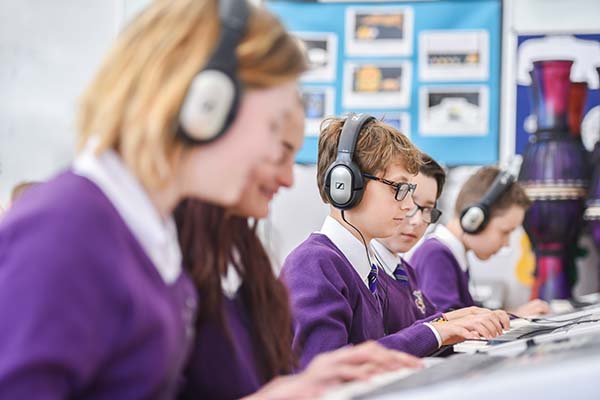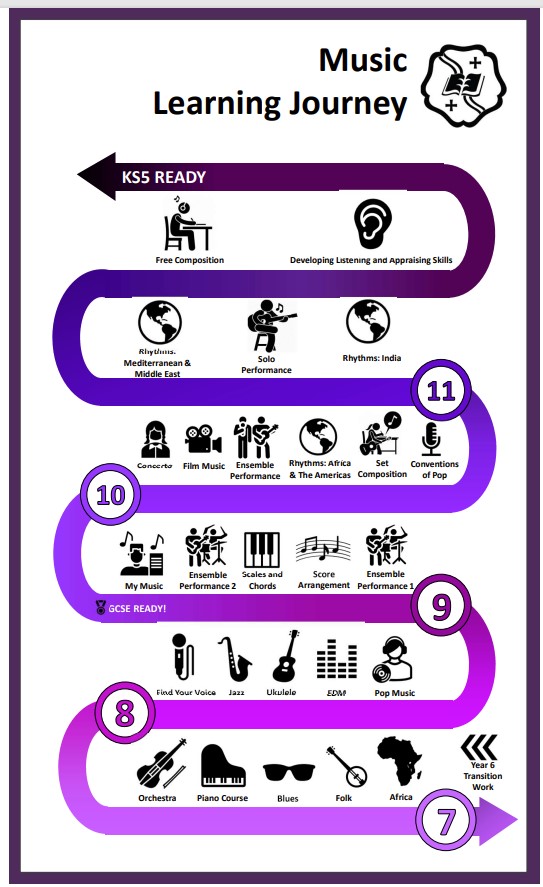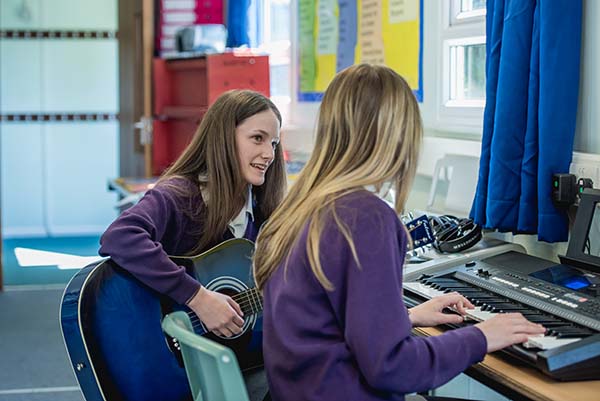
Our high-quality music education will engage and inspire pupils to develop a love of Music and their talent as musicians, and so increase their self-confidence, creativity and sense of achievement. As pupils progress, they will develop a critical engagement with Music, allowing them to compose, and to listen with discrimination to the best in the musical canon enabling lifelong participation in, and enjoyment of, Music, as well as underpinning excellence and professionalism for those who choose to pursue the wide range of career opportunities within the industry.

OCR’s GCSE (9–1) in Music will provide a contemporary, accessible and creative education in Music with an integrated approach to the three main elements – performing, composing and appraising. Learners are encouraged to be creative and to broaden their musical horizons and understanding with Areas of Study that inspire and challenge. Through the various styles and eras contained in our Areas of Study they will explore musical context, musical language, and performance and composition skills with a focus on their own instrument and genre choices.
Exam Board: OCR
Qualification Title: Music
Qualification Specification Code: J536
Qualification Webpage: Click here to visit the OCR webpage for the specification.
OCR’s GCSE (9–1) in Music is designed to appeal to, and cater for, a wide range of interests, instruments, personalities and directions. Learners will have the opportunity to explore instruments and Areas of Study depending on their personal preference and ability.
No prior knowledge or learning of the subject is required. A background in music, for example, learning to play an instrument in an extra-curricular capacity would be beneficial.
OCR’s GCSE (9–1) in Music will encourage learners to:
• engage actively in the process of music study
• develop performing skills individually and in groups to communicate musically with fluency and control of the resources used
• develop composing skills to organise musical ideas and make use of appropriate resources
• recognise links between the integrated activities of performing, composing and appraising and how this informs the development of music
• broaden musical experience and interests, develop imagination and foster creativity
• develop knowledge, understanding and skills needed to communicate effectively as musicians
• develop awareness of a variety of instruments, styles and approaches to performing and composing
• develop awareness of music technologies and their use in the creation and presentation of music
• recognise contrasting genres, styles and traditions of music, and develop some awareness of musical chronology
• develop as effective and independent learners with enquiring minds
• reflect upon and evaluate their own and others’ music
• engage with and appreciate the diverse heritage of music, in order to promote personal, social, intellectual and cultural development
Integrated Portfolio (01 or 02)
60 Marks
Non-exam assessment
30% of total GCSE
Performance on the learner's chosen instrument.
Composition to a brief set by the learner.
Practical Component (03 or 04)
60 Marks
Non-exam assessment
30% of total GCSE
Ensemble performance.
Composition to an OCR set brief.
Listening and Appraising (05)
80 Marks
1 hour 30 minutes written paper
40% of total GCSE
Listening and appraising.
A written paper, with CD.
Aural recognition and context unheard/unfamiliar music from within the Areas of Study 2, 3, 4 & 5
Performer, Composer/Artist, Songwriter, Arranger, Session Musician, Music Producer, Sound Designer, Film Composer, Video Game Composer, Radio DJ, Music Teaching, Music Therapy, Instrumental Teaching, Events Management, Business and Arts Management, Performing Arts, Journalism, Music Marketing, Music Distribution, A&R Representative, Promotor, Tour Manager, Studio Recording Engineer, Technician, Live Sound Engineer, Acoustic Engineer, Audio Network Specialist, Event Sound Designer, Acoustic Consultant, Venue Sound Manager, Show Control Systems Engineer, Music Editor, Audio Programmer, Sound Effects Designer, Virtual Instrument Developer, Media Composer, Podcast Music Producer, Ambient Music Producer, Cinematic Sound Designer, Audio Branding Specialist, Digital Music Composer, Interactive Audio Designer, Music App Developer, AI Music Specialist, Sound Installation Artist, Music Content Creator, Virtual Reality Sound Designer, Augmented Reality Music Specialist.
Mr Bannister

Owned by: MDS | Last Published: 20/09/2019 09:53:36 | Next Update: N/A